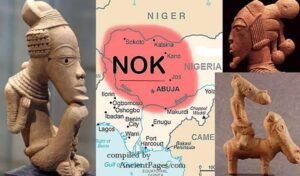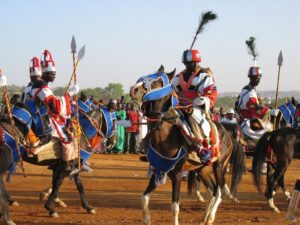Back to: Religion and National Value JSS2
Welcome to class!
In today’s class, we’re going to be talking about the continuation of Nigerian civilizations and cultures. I trust you will enjoy the class!
Continuation of Nigerian Civilizations and Cultures
Nigeria, often referred to as the “Giant of Africa,” is renowned for its rich cultural heritage and history. The continuation of Nigerian civilizations and cultures is a testament to the resilience and adaptability of its people.
Understanding Nigerian Civilizations

– Nok Civilization: Known for its terracotta sculptures, the Nok civilization thrived between 500 BC and 200 AD.
– Ife Civilization: The city of Ife is considered the cradle of Yoruba culture, famous for its bronze and terracotta artistry.
– Benin Civilization: The Benin Empire was one of the oldest and most developed states in West Africa until its annexation by the British.
Cultural Diversity
Nigeria is home to over 250 ethnic groups, each with its unique language, traditions, and customs. This diversity is reflected in the country’s music, dance, art, and festivals.
Examples of Cultural Continuity

– Festivals: The Argungu Fishing Festival and the Osun-Osogbo Festival continue to be celebrated annually, attracting tourists and preserving traditions.
– Languages: Despite globalization, many Nigerian languages like Hausa, Yoruba, and Igbo are still widely spoken and taught in schools.
– Traditional Rulers: The institution of traditional rulers like the Oba of Lagos and the Emir of Kano remains influential in modern Nigeria.
The Role of Culture in National Values
– Unity in Diversity: Nigeria’s motto, “Unity and Faith, Peace and Progress,” encapsulates the importance of cultural harmony.
– Moral Values: Respect for elders, hospitality, and community service are core values passed down through generations.
– Civic Responsibility: Cultural practices often emphasize the importance of contributing to the community and nation.
Challenges and Preservation
– Modernization: Balancing modern influences with traditional values is a challenge for many Nigerian communities.
– Cultural Education: Schools play a crucial role in teaching the history and values of Nigerian cultures to the younger generation.
– Cultural Festivals: These events serve as platforms for cultural exchange and education, ensuring the continuation of traditions.
The civilizations and cultures of Nigeria continue to thrive through the dedication of its people to preserve their heritage. By understanding and valifying these cultures, we ensure that the rich tapestry of Nigerian history remains vibrant for future generations.
We have come to the end of today’s class. I hope you enjoyed the class!
In the next class, we shall be discussing about Promoting Cooperation.
In case you require further assistance or have any questions, feel free to ask in the comment section below, and trust us to respond as soon as possible. Cheers!
Question Time:
- Describe the Nok civilization and its contributions to Nigerian history.
- Compare and contrast the Ife and Benin civilizations in terms of their art and cultural impact.
- How does Nigeria’s cultural diversity contribute to its national identity?
- Discuss the importance of preserving indigenous languages in Nigeria.
